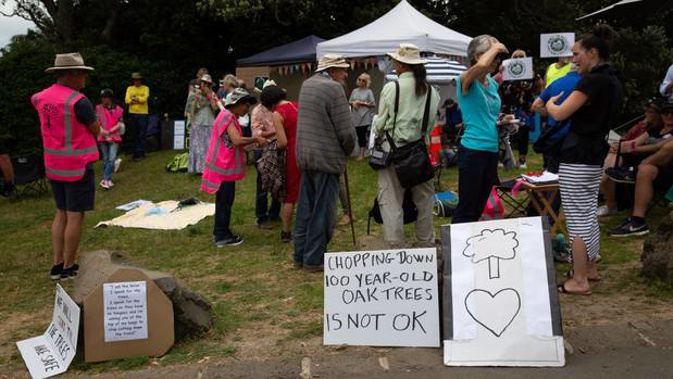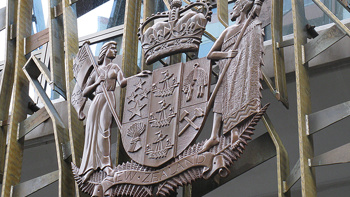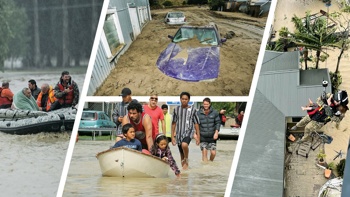
Those protesting plans to remove hundreds of exotic trees from an Auckland maunga have been labelled "woke, entitled Pākehā" during a hui that at times boiled over in emotion.
The Tūpuna Maunga Authority (TMA), which co-governs the city's 14 tūpuna maunga (ancestral mountains), plans to remove 345 exotic trees from Ōwairaka/Mt Albert and plant 13,000 natives as part of a long-term restoration project.
But a group of protesters have occupied the maunga since November 11, preventing contractors from starting what was meant to be a month-long job.
The authority - established after the maunga were transferred to mana whenua in a 2014 Treaty settlement - on Thursday morning held a hui near the summit to address concerns, drawing about 200 people from all walks of life.
About 60 protesters opted not to attend and remained at the foot of the maunga.
TMA operations manager Nick Turoa spoke of their restoration plan in the wider context of colonisation, land confiscations, and the alienation of Māori from their whenua and culture.
"There are few places left where Māori culture has not been destroyed or modified. This is about restoring significance of mana whenua to these sites."
Protester Lisa Prager said she acknowledged the "pain of colonialism" but that "we are all human".
"This broad stroke, this annihilation, this utu on the exotics, this does not serve us as a people."
Fellow protester Suala Wilson said she moved to New Zealand from Samoa 50 years ago but felt like she was "mana whenua".
"My waka was Air New Zealand."
/arc-anglerfish-syd-prod-nzme.s3.amazonaws.com/public/UUUYLY37BJCR3DFYK4M2GZVV2U.jpg)
There were a range of opinions on display at Thursday's hui atop Ōwairaka/Mt Albert. Photo / Michael Neilson
She was learning te reo Māori, she said, and performed a karanga before delivering what she described as a "message from beyond" to the TMA about the trees.
"If you choose to ignore this message from beyond, you will be forever lost."
Independent Māori Statutory Board (IMSB) deputy chair and former MP Tau Henare then took to the microphone to voice his discomfort.
"I have never been colonised twice in one day. To the two women, thank you for that experience."
The IMSB "100 per cent" supported the TMA's plans, which were about more than trees, but about mana.
"What I find personally appalling behaviour is after all the work with the Government, council, Treaty settlement, consultation, to come here this morning and feel like a f...... criminal."
He said those protesting were a "bunch of woke, entitled, Pākehā".
Māngere arborist Zane Wedding said people simply claiming mana whenua - the concept of historical or territorial rights over an area - was "insulting".
"I am Ngāti Pikiao, but I am not mana whenua. My mum fought for the idea to exist, now a whole heap of people are claiming it."
Wedding said as a young urban Māori, growing up disconnected from his culture, the TMA's plans to restore mana to the city's maunga was "empowering".
He applauded Pākehā in support.
"You represent the future of New Zealand, the ngāhere (forest) will represent the new, New Zealand, not these stains of colonial past."
He also questioned why the group was not protesting other trees being felled across the city on private land.
"But when iwi do it, all of a sudden everyone is triggered."
A young Māori woman, holding her baby daughter, said through tears the protesters, whether intentionally or not, were "unlocking racism".
"We hear about the lizards and the trees – think about the slightly bigger process."
Charmaine Pountney said it was important for Pākehā to stand up and be good Treaty partners.
"I think many people don't understand the history, or if they do they dismiss it, which is cruel and foolish.
"It is time for Pākehā to trust tāngata whenua. The authority is about both parties coming together - what was promised in the Treaty. We are here as Treaty supporters."
Anna Radford, who had been leading protests since day one, said it was not an easy decision to not attend the hui.
"We are damned if we do and damned if we don't."
She reiterated they supported the long-term restoration plans, but were concerned about how all 345 exotic trees were to come down at once.
There had been poor communication from the TMA, and the process was a "lost opportunity".
"If they had been more engaged and open from the start it could have been a much more constructive process."
When asked about the hurt their protest had been causing Māori, Radford said that was never the intention.
"This is not a Māori versus Pākehā thing. The TMA exists to address terrible past, but also has a responsibility for benefit of all people of Auckland."
TMA chair Paul Majurey said he was "saddened" majority of the protesters opted not to attend,
"Had the group been there and heard the different worldviews that may have helped bring a resolution."
Still, the hui had been a "very positive" experience and he was looking forward to hearing from the protesters and discussing a way forward.
"There is clearly a lot of love and passion for the maunga."
Background
The city's 14 tūpuna maunga were transferred to the mana whenua tribes of Auckland in a 2014 Treaty settlement.
They are managed by the Tūpuna Maunga Authority, made up of six iwi representatives, six Auckland Council representatives and one non-voting Crown representative.
The authority is independent of the Council and has decision-making powers and functions.
Majority of the city's maunga were important Māori pā (settlements), making them separate from other parks and open spaces in that they were wāhi tapu - sites of immense spiritual, ancestral, cultural, customary, and historical significance to mana whenua.
The tree removals are the latest in the wider restoration project to replace hundreds of exotic trees on the city's maunga with 74,000 new native trees and shrubs by 2021, to "restore the mana".
In March, 150 trees were removed from Māngere Mountain/Te Pane o Mataoho/Te Ara Pueru, in April 112 trees from Ōhuiarangi/Pigeon Mountain, and last year a two-year removal of 100 pine trees began on Maungarei/Mt Wellington.
The aims of the city-wide project were to reconnect native ecological networks within and between the 14 maunga and the wider landscape, and also improve the sightlines.
Take your Radio, Podcasts and Music with you









